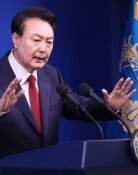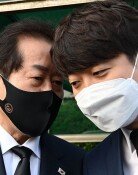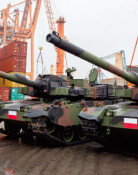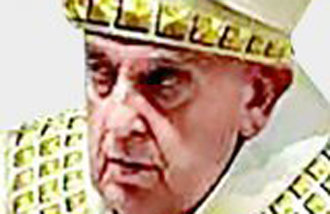Kim Dong-Seok, Leader of Special Agents Dispatched to North Korea
Kim Dong-Seok, Leader of Special Agents Dispatched to North Korea
Posted October. 24, 2005 03:03,
Kim once said, The expression this man was used by General Douglas MacArthur when he referred to a picture of mine. I provided him with vital intelligence during the Incheon landings and the recovery of Seoul. He added, It is the norm that secret agents dispatched to North Korea keep their secrets to the very moment they die. Given that the reality of these special agents was already disclosed a couple of years ago in the movie Silmido, however, I published this book because I believe they deserve proper compensation and evaluation.
Kim explained in his memoirs, At dawn on February 8, 1954, right after the cease-fire, special agents in the K team infiltrated into the enemy base near Tongcheon, Gangwon Province to persuade Lee Young Hee, the division commander of the North Korean Peoples Army, to surrender to the South and handed him over to U.S. forces through a helicopter, introducing the real names of Messrs. H, J and K, who served as agents at that time. The surrender operation has been only rumored for the last 50 years, but has never been officially announced.
He also said that during the Korean War, special agents made great contributions to securing important information by capturing or helping the defection of six to seven North Korean high-level commanders or field-grade officers, including one colonel of the North Korean Peoples Army.
The memoirs include detailed explanations of the operating areas and infiltration paths of special agents dispatched to the North. During the war, the 36th District Unit clandestinely dispatched three of its teams to the closest battlefields with the North Korean army in an effort to conduct two to three infiltration operations a month. After the truce was signed, it withdrew to Gangwon Province to continue operations, said Kim.
Kim also recalled one anecdote with former President Park Jung-hee. He said, While serving for Japanese troops in Manchuria, Park Jung-hee and Jung Il-gwon faced the defeat of imperialist Japan and hurried back to Korea. However, they were arrested by Soviet forces in October 1945 on the ground that they were pro-Japanese Koreans.
He explained the two succeeded in escaping while they were being transferred through a freight train and safely crossed the border to come to South Korea with the help of himself, who then was the captain of the Joseon Patriotic Loyal Force.
In response, former President Cho Gab-je of the Monthly Chosun argued in his October 23 posting on his homepage, Former President Park Jung-hee had never been arrested by Soviet forces. Park Jung-hee and Jung Il-gwon served in the army of Manchuria, the puppet state of Japan, not in the Japanese troops.
Kim plans to hold the official release ceremony of his book on October 26 in the War Memorial of Korea in Yongsan, Seoul, which will be attended by popular singer and his daughter Jin Mi-ryung (whose real name is Kim Mi-ryung), former Defense Minister Kim Sung-eun and other former special agents.
Born in Myeongcheon, North Hamgyeong Province, Kim graduated from the Korean Military Academy and fought in the Korean War as the commander of the 11th Company of the 17th Regiment. In September 1950, he started working in the field of intelligence when he was appointed as the liaison officer with the U.S. Forces in the Intelligence and General Staff Office of the Army Headquarters.
Since then, he had served as the head of a district unit in the 1st Division of the Army Intelligence Corps and had been in charge of the 36th District Unit from 1952 to the eve of the Military Coup Détat of May 16, 1961. After leaving the military, he became the mayor of Gangneung and Samcheok, Gangwon Province and Suwon, Gyeonggi Province and served as the vice chairman of the Korea Judo Association.
In 2002, the 2nd Infantry Division of the U.S. Forces acknowledged Kims contribution by establishing the Kim Dong-seok Commemoration Hall in the War Memorial within its base. It also selected him as one of the Four Heroes of the Korean War along with General MacArthur, General Ridgway and General Baek Seon-yeop.
Regarding the fact that his daughter Mi-ryung has widely said to be a Chinese-Korean, Kim explained in his interview with the Associated Press, I had once sent Mi-ryung to a Chinese school as I had personal friendship with the Chinese ambassador, and Mi-ryung had also studied in Taiwan for one year. I guess all this added up to trigger such a rumor.
Sang-Ho Yun ysh1005@donga.com
Headline News
- Korean president faces debate limitations unlike U.S. counterpart
- KEPCO's first quarter profits failed to meet market expectations
- Teenagers are left out of discussions about national pension
- 2 consultative bodies submit minutes regarding increasing number of medical students
- Woo Sang-hyuk's rivalry and friendship transcend borders







